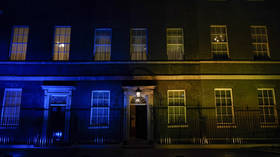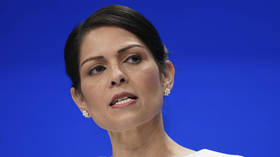London takes back 'Putin regime change' claim

Toppling Russia's President Vladimir Putin is the goal of the new wave of international sanctions introduced in response to Moscow's offensive in Ukraine, a spokesman for Britain's Prime Minister Boris Johnson told reporters on Monday. Downing Street later clarified that the spokesperson had “misspoken”.
"The measures we are introducing, that large parts of the world are introducing, are to bring down the Putin regime," the unnamed official said.
The restrictions, centered around Russia's financial sector, are aimed to "inflict financial pain on Putin", the spokesman went on. The sanctions are also meant to "stymie the Russian war machine as it attempts to subjugate a democratic European country," he added, referring to the Ukraine conflict.
Further enquiry on the "regime" change remark, however, prompted the spokesman to somewhat quickly backtrack, insisting that London has not actually been actively seeking to do so.
"We are not seeking anything in terms of regime change, what we are talking about here clearly is how we stop Russia seeking to subjugate a democratic country," the spokesman said, warning "that businesses should think very carefully if they are still continuing to do anything that props up the Putin regime." Downing Street then later said the PM’s spokesman “misspoke” when he claimed that the sanctions aimed “to bring down the Putin regime.”
The new wave of Western restrictions, that included personal sanctions against Foreign Minister Sergey Lavrov and against President Putin, come amid Moscow's special military operation in neighboring Ukraine launched last week. The operation’s stated goal is to protect the breakaway republics of Donetsk and Lugansk from an allegedly imminent all-out offensive by the Kiev forces, Moscow has claimed. Days before the launch of the operation, Russia formally recognized the republics as independent states.
Ukraine, however, branded the attack "unprovoked”, insisting it has had no plans to attack the republics. Donetsk and Lugansk broke away from Kiev back in 2014, following the Maidan coup that ousted the democratically elected government of the country.













